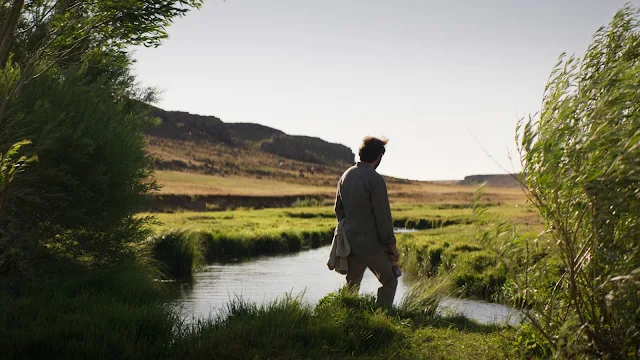 |
| Deniz Celiloglu in About Dry Grasses |
Cast: Deniz Celiloglu, Merve Dizdar, Muzab Ekici, Ece Bagci, Erdem Senocak, Yüksei Aksu, Münir Can Cindoruk, Onur Berk Arslanoglu, Yildrim Gücük, Cengiz Bozkurt, Emrah Özdemir, Elif Ürse, Elt Andaç Çam. Screenplay: Akin Aksu, Ebru Ceylan, Nuri Bilge Ceylan. Cinematography: Cevahir Sahin, Kürsat Üresin. Production design: Meral Aktan. Film editing: Oguz Atabas, Nuri Bilge Ceylan. Music: Philip Timofeyev.
Midway in the third hour of Nuri Bilge Ceylan's About Dry Grasses, he breaks the third wall. Actually, he breaks all of them: The camera follows the protagonist down a hall and through a door that opens onto the studio where the set has been constructed. We see the crew moving about in the studio and the actor going to what may be his dressing room, where he takes a pill and then returns to the set. We then follow him back onto the set and the film proceeds with no further such interruptions. It's an audacious moment that breaks the tension but not the mood. We have just witnessed a long scene that's the intellectual and moral heart of the film, and we're anticipating something physical and emotional to happen. The effect is to add another layer to an already complex narrative that centers on the film's anti-hero, Samet (Deniz Celiloglu), a schoolteacher in a remote Turkish village. Samet hates it. He hates the climate, which he says has only two seasons, winter and summer. In the former it's covered with snow and in the latter with dry grass. He hates the school administration and some of his fellow teachers. He hates the social and political unrest that plagues the region. He hates its poverty and ignorance. And as you can guess, he hates himself for not being able to escape. He also hates his students, except for one pretty young girl, Sevim (Ece Bagci), in whom he takes an interest that will get him into a lot of trouble. His only release is in griping to his roommate, Kenan (Muzab Ekici) and to a woman they meet, Nuray (Merve Dizdar), who teaches at another school in the area. Nuray lost a leg in a terrorist attack, but she copes with the loss and with the less than ideal circumstances in her life. Eventually, the plot will center on the relationship of Samet, Nuray, and Kenan, which Ceylan uses to explore topics like survival, commitment, endurance, and more. Celiloglu is superb at playing a character we come to loathe even as we maintain a certain sympathy for him, but the triumphant performance in the film is by Dizdar, who won the best actress award at Cannes for the film. About Dry Grasses is overlong but it's filled with moments of beauty in which we come to see the landscape that so plagues Samet with other eyes than his.